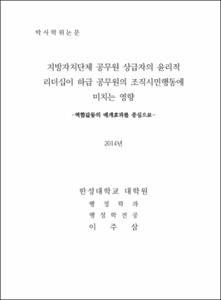지방자치단체 공무원 상급자의 윤리적 리더십이 하급 공무원의 조직시민행동에 미치는 영향
= The Influence of Senior's Ethical Leadership on Lower-Level Officials' Organizational Citizenship Behavior in Local Public Officials : Centering on the Mediating Effect of Role Conflict
- Type
- Thesis
- Alternative Title
- 역할갈등의 매개효과를 중심으로
- Advisor
- 이창원
- Department
- 대학원 행정학과
- Issued Date
- 2014
- Publisher
- 한성대학교 대학원
- Files in This Item:
-
-
Download
 000001677516.pdf
기타 데이터 / 1.07 MB / Adobe PDF
000001677516.pdf
기타 데이터 / 1.07 MB / Adobe PDF
-
Items in Repository are protected by copyright, with all rights reserved, unless otherwise indicated.